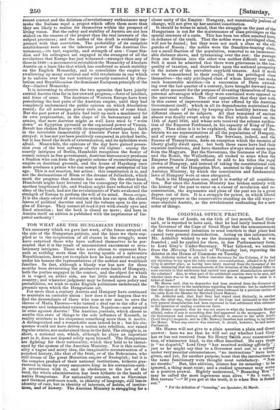COLONIAL OFFICE PRACTICE.
IN the House of Lords, on the 15th of last month, Earl Grey said, or is reported to have said, that he had lately learned from the Governor of the Cape of Good Hope that the announcement of the Government intention to send convicts to that place had caused very general dissatisfaction. Acting on this information-, Mr. Adderley wished to see the documents on which it was founded ; and he applied for them, in due Parliamentary form, to Lord Grey's Under-Secretary. What followed, we extract from the Morning Chronicle of Wednesday last, reporting the debates in the House of Commons on Tuesday.
Mr. Adderley wished to ask the Under-Secretary for the Colonies, if he had any objections to lay upon the table certain communications, alluded to by Earl Grey in another place' as having been lately received from the Governor of the Cape, intimating that the announcement of the intention of the Colonial Office to send convicts to that settlement had excited very general dissatisfaction amongst the colonists? Also, to what part of the settlement convicts were to be sent, and whether there was to be any further restraint than is supposed to exist in a ticket-of-leave ?
Mr. Hawes said, that no despatches had been received from the Governor at the Cape in answer to the instructions regarding the convicts: but he understood that the object of this motion had already been embraced by a previous motion of the noble Lord the Member for Hertford (Lord Mahon).
Mr. Adderley said, that Earl Grey had stated most distinctly, in another place, the other day, that the Governor of the Cape had intimated to him that very general dissatisfaction had been expressed in that settlement with reference to the intention of sending convicts out there. Mr. Hawes repeated, that he was not aware to what the honourable Member alluded, unless it was to something that had appeared in the newspapers. Bit the Government had received nothing officially in answer to the noble Lord's (Lord Grey's) despatch; and he (Mr. Hawes) therefore had nothing to lay before the House. When any answer was received, it should, however, be laid before Parliament.
Mr. Hawes will not give to a plain question a plain and direct answer : here we see that he will not say whether Lord Grey has or has not received from Sir Henry Smith some communica- tion, of whatsoever kind, to the effect described. He says there is "no despatch," Lord Grey "has received nothing officially" ; just as he might say that to a Governor sent out to a colony under very peculiar circumstances, "no instructions" have been given, and yet, for another purpose, boast that the instructions to the same functionary were thought most satisfactory. "Neil mi ricordo." But, like oblivion, silence has its meaning : to be ignored, a thing must exist; and a studied ignorance may serve as a positive avowal. Rightly understood, ' Bouncing Ben" may be called the most ingenuous man alive. " Se e vero, Ben trovato "—"If you get at the truth, it is when Ben is found out."
* For the definition of "bouncing," see Speciator, 8ci March.


























 Previous page
Previous page